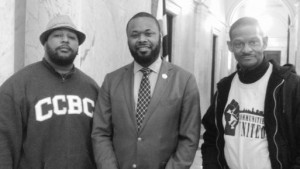
Del. Cory McCray, center, sponsor of the House bill to expand felon voter rights, poses with John Comer, left, and Perry Hopkins, two of the lead advocates on the issue, after the House passed McCray’s bill on April 8. (Courtesy Photo)
Some late maneuvering spearheaded by Baltimore City legislators and advocates has helped secure passage of the Maryland Second Chance Act, which will make certain non-violent misdemeanor convictions eligible to be hidden (“shielded” in technical parlance) from employers performing background checks.
The act, which Gov. Larry Hogan (R) is in support of and is expected to sign into law, faced an uncertain fate as the final full week of the 2015 legislative session drew to a close after changes to the House version of the act (House Bill 244) by the House Judiciary Committee left a number of advocates and legislators feeling that the bill had been effectively gutted.
At issue was whether the act would only allow a person to apply to have a single conviction shielded in a single jurisdiction (here a county or Baltimore City), or all eligible convictions in a single jurisdiction.
Two things occurred while the Judiciary Committee was debating the House version of the act, according to Del. Curt Anderson (D-Baltimore City), member of the Judiciary Committee and sponsor of the House version of the act. First, Chief Judge of the District Court of Maryland John Morrissey told Judiciary Committee members that he read the Senate version to only allow for the shielding of a single conviction—or a single set of convictions stemming from a single event—in a single jurisdiction. Second, the committee’s counsel changed the phrase “all shieldable convictions” in the original drafting of the bill to “one or more shieldable convictions.”
Advocates, led by Caryn Aslan, senior policy advocate with the Job Opportunities Task Force, say that, in doing so, the Judiciary Committee changed the language in order to reflect the interpretation given by Morrissey, tacitly adopting his interpretation and effectively gutting the act. But Anderson says that the phrase was changed simply to conform to standard modes of statutory construction in Maryland, where he says statutory language utilizes “one or more” rather than “all,” and that the language change was not related to Morrissey’s reading of the act.
“’One or more’ does not imply singular,” said Anderson.
In addition to those language changes, the Judiciary Committee also stripped out a $1,000 penalty for violation of the law by employers, raising the ire of advocates and a number of freshman delegates, especially from Baltimore.
Del. Brooke Lierman (D-Baltimore City) prepared an amendment to the bill which would have undone the language changes that were made by the Judiciary Committee, and was set to present her amendment when the Second Chance Act was to be debated on the floor of the House chamber on April 9.
With Lierman’s attempt to amend the bill looming, and advocates working behind the scenes to put pressure on delegates to reject the Judiciary Committee’s language changes to the act, the committee’s leadership agreed to consider Lierman’s amendment in a committee session rather than on the floor of the full House.
The Judiciary Committee convened on the afternoon of April 9, tweaked Lierman’s amendment slightly, and approved it as a friendly amendment on a 12 to eight vote. Lierman’s amendment was then presented as a committee amendment on the House floor on April 10 and passed the House chamber, setting up the Second Chance Act as a whole to be voted on April 11, where it passed the House on an 81 to 56 vote.
The Second Chance Act will soon head to Hogan’s desk for his signature. The Governor has publicly supported the bill and is fully expected to sign it into law.
Work remains, however, with a number of Democrats feeling that the law could be strengthened to allow the shielding of eligible convictions across multiple Maryland jurisdictions, as opposed to one. As Judiciary Committee member Del. Vanessa Atterbeary (D-Howard County) put it, limiting shielding to convictions that occurred in a single jurisdiction “wasn’t the intent of the bill,” despite Morrissey’s reading of the language.
At days end, what is important, says Anderson is that a bill has passed that will start benefiting some and which can be strengthened later.
“I don’t care what form the bill passes in to get started. It will help some people. It’s not perfect, but I’m not going to sit here and try to make the bill perfect because that’s the enemy of the good as they say. . . . We don’t have any yet, and that’s what legislation, compromise, working together is all about,” said Anderson.
ralejandro@afro.com


